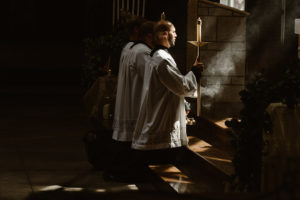The Humanevangelist: If the Pope Can’t Change the Church, Who Can? Everyday Catholics, That’s Who
 Photo by Josh Applegate on Unsplash
Photo by Josh Applegate on Unsplash Seen in the light of Catholic doctrine, Pope Francis may appear to be the most powerful person in the world. He has authority (backed by God) over some 1.2 billion people spread across every continent. More particularly, the pope has the unchallengeable authority to decree that clerics who sexually abuse minors or cover up for others who do will be dismissed and turned over to civil authority for prosecution.
Instead, at a conclave of bishops last week, he called for a change of heart. The Vatican says there’s more to come, but when? It’s not like the scandal is news. The Boston Globe broke the story in 2002. A Pennsylvania grand jury exposed more than 300 predator priests more than a year ago. And Pope Francis himself just defrocked Cardinal Theodore McCarrick for sexual abuse. Yet, he left bishops with the authority to decide for themselves when and how to act.
Let’s try to put this in perspective. Imagine if one of the world’s most powerful corporations—let’s say a transnational oil and gas giant—were rocked by scandal. Imagine that the scandal involved molesting, raping, and even perhaps killing children, as well as numerous instances of sexual intimidation and rape of corporate staff, both male and female. Now imagine that the scandal continued even after exposure, not for a year or two, but for a decade and more. Imagine further that the board hired a new CEO who vowed “zero tolerance,” and yet six years later the scandal remained on the boil, with ever-more horrifying revelations coming to light.
Could such a corporation survive? Would anyone buy its products? Would lawmakers tolerate its presence in their land? Seems unlikely. Yet, the Catholic Church remains an unreformed global power. How can that be?
It starts with the belief that it alone possesses the magisterium to provide teachings and rituals that lead to salvation. The church is structured as a monarchy, complemented by an aristocracy of cardinals, archbishops, and so on. There is no semblance of democracy in the Catholic Church.
Compounding matters, a tradition of secrecy and loyalty holds sway within the hierarchy. Then there’s that pesky celibacy clause. It’s hard to know whether clerical celibacy attracts men who are likely to abuse, or whether once enchained by it the sexual urge overpowers moral restraint. One thing is certain: sexual abuse is nothing new in the Catholic Church. Accounts of it date back at least ten centuries.
Until quite recently, the priesthood appealed to some homosexual men—whether they hoped to suppress their sexuality or to have the opportunity to secretly indulge it. Many novices learned in seminary that their fate was to be the prey of instructing superiors. But the idea that this is an issue of sexual orientation is absurd. Heterosexual abuse by priests has also flourished in the church for centuries—and the extent of it is only now coming to light.
Sexuality, like hunger, is among the most powerful of human instincts. Combine that with mystical power, an all-male hierarchy, and a culture of cover-ups, and it’s little wonder that abuse followed. Writing on this topic last summer, I admitted it would be arrogant for me, a non-Catholic, to tell my Catholic friends how to take control of their church. Given the lack of accountability among its leadership, I would now say the laity has two choices: protest, or walk away.
Americans have done both. In the past year the percentage of American Catholics who approve of Pope Francis’s handling of the scandals has plunged, from 46 percent to just 31 percent, according to the Pew research organization. The percentage who regularly attend church has fallen as well, to a historic low of 39 percent. For that matter, the portion of Americans who identify as Catholic has fallen faster than any other group, to a low of 21 percent.
Globally the church remains steady, largely because of its success in proselytizing in sub-Saharan Africa—where a Vatican-led anti-condom propaganda campaign has contributed to the misery of the AIDS epidemic.
So, what can the remaining American Catholics do? Ideally, they would take their church into their own hands, but that requires breaking the spell. Personally, I won’t use the title “Father” for a priest; I can respect their humanity without the title. But then I’m not a Catholic, and I recognize that it’s no easy thing for a believer to do. This is a medieval institution that claims Christ gave its hierarchy “the right to enforce obedience.”
Still, if ordinary Catholics don’t want the sins of the fathers to be on their heads, they must speak up. After all, most American Catholics tacitly refuse to obey absurdities like the ban on medical contraception. They know in their bones that blind obedience is wrong.
Of course, it’s a rare individual who stands up in church and cries, “shame” at the man in the miter and flowing robes. But this need not be a solo effort. Parishioners can join one of the lay groups pressing for reform. If abused, they can sue. They can withhold their treasure from the church. They can demand equal rights for women at every level, an end to the celibacy clause, accountability for all, and ultimately the transformation of their church into a democratic, egalitarian religious organization. Surely, that’s what a God worth worshiping would want.
